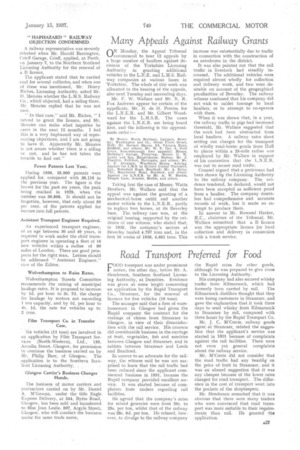Many Appeals Against Railway Grants O N Monday, the Appeal Tribunal
Page 29

If you've noticed an error in this article please click here to report it so we can fix it.
commenced to hear 12 appeals by a large number of hauliers against decisions of the Yorkshire Licensing Authority in granting additional vehicles to the L.N.E. and L.M.S. Railway companies at various bases in Yorkshire. The whole of this week was allocated to the hearing of the appeals, also next Tuesday and succeeding days.
Mr. F. W. Wallace and Mr. N. It, Fox Andrews appear for certain of the appellants, Mr. B. de H. Pereira for the L.N.E.R. and Mr. Gilbert Woodward for the L.M.S.R. The cases against the L.N.E.R. are being heard first, and the following is the approximate order :—
By MORS:g. Watts Brothers, Lairgate, Beverley; Waddington and Ga., Great Union Street, Hull; Mr, Herbert Shores, 64, Victoria Road, Driffieki, and others; Mr. W, E. Day, 4, Park Grove, Kaaresborough ' two appeals); Messrs. Holliday's Garage, Pickering; Messrs. 0. W. Lawty sod Son,' Helperthorpe, Malian; Mr. J. Franklin, F.ollifoot, Harrogate, and others; Mr. C. F. .Abrahars, Woodburn House, Askrigg. Against the L.M.S.•hy Hyburn Dnite&Transpert, Ltd., Wakefield Road, 'Bradford; Mr. A. Batty, 751, Manchester Road, Bradford, and others. Against the L.N.E.R. by Mr. A. W. Buckle, Temple Lane, Acaster, Melbis, and others.
Taking first the case of Messrs. Watts Brothers, Mr. Wallace said that the appeal was against the granting of a mechanical-horse outfit and another motor vehicle to the L.N.E.R., partly to replace two horses, at its Beverley
• base, The railway case was, at the original hearing, supported by the evidence of one witness, who stated that, in 1935, the company's motors at Beverley hauled 4,797 tons and, in the first 16 weeks of 1936, 4,661 tons. This increase was substantially due to traffic in connection with the construction of an aerodrome in the district.
It was also pointed out that the rail traffic in livestock had steadily in creased. The additional vehicles were required almost wholly for collection' and delivery work, and two were de sirable on account of the geographical peculiarities of Beverley. The railway
witness confessed that his company did not wish to sublet tonnage to local hauliers, or to attempt to co-operate with them.
When it was shown that, in a, year, the railway traffic in pigs had increased threefold, Mr. Wallace suggested that the work had been abstracted from local hauliers. A railway rates sheet setting out charges for the transport of wholly road-borne goods from Hull to places within a 25-mile radius was employed by Mr. Wallace in support of his contention that the L.N.E.R.
was out to secure road traffic. • Cou,nsel argued that a preference had been shown by the Licensing Authority to the railway company. The evi dence tendered, he declared, would not have been accepted as sufficient proof from a haulier. The company doubtless had comprehensive and accurate records of work, but it made no attempt to produce them.
In answer to Mr. Rowand Harker, KG., chairman of the Tribunal, Mr.
Wallace submitted that a B licence was the appropriate licence for local collection and delivery in connection with a trunk service.




















































































